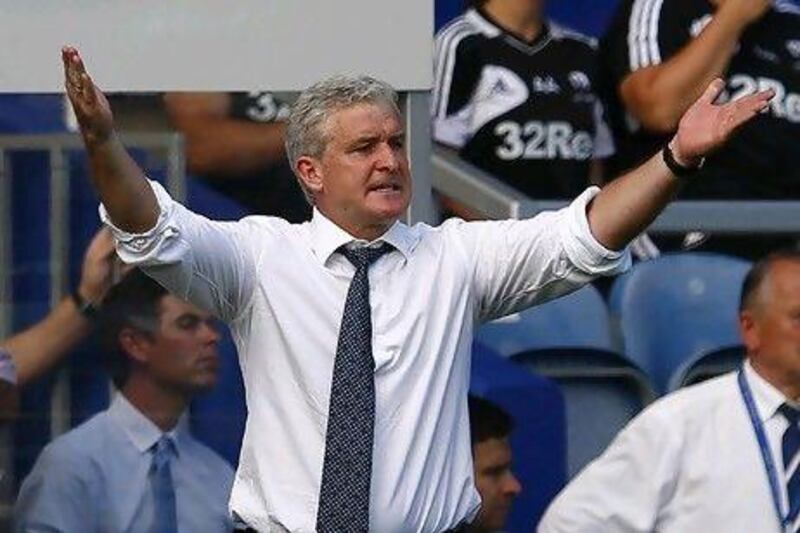In the second half of a sunny first afternoon of the Premier League season, a chant began in West London, a group of supporters calling for Mark Hughes's dismissal.
Thankfully, perhaps, for the Queens Park Rangers coach, it was the Fulham fans mocking their former manager. The Loftus Road public were presumably too dumbstruck by what they were witnessing to come up with any coherent response.
Not that the logical response is to sack Hughes. Opening-day results can be wildly deceptive - such as when Manchester United lost 3-1 to Aston Villa in August 1995, before "Fergie's Fledglings" went on to do the league and cup double - but they can also set the tone for the season. In 2001, Leicester City hosted a Bolton Wanderers team widely tipped for demotion and were duly demolished 5-0. Nine months later, one of those sides was indeed relegated: Leicester.
By losing 5-0 to Swansea City, QPR provided parallels with that particular nightmare on Filbert Street. For their supporters, a closer comparison may have been their first game of last season, when Bolton - who went on to drop a division themselves - won 4-0 at Loftus Road. A year on, however, Rangers are a radically different team. Only two men, Clint Hill and Adel Taarabt, started both August embarrassments. Around them, one of the more expensive footballing makeovers has taken place.
And, while teams can take time to gel, both the manner and the margin of the setback against Swansea should raise serious questions about Rangers' rebuilding. As Michael Laudrup's side also hit the woodwork twice in the first half, it is no exaggeration to say they could have won by seven goals.
As it was, seven of Hughes's signings started. A further two were on the bench and, including Friday's addition of Jose Bosingwa, there are 11 in all. This is his team, one whose cost - both in terms of transfers and wages - suggests they should be in the top 10.
Yet the blueprint appeared seriously flawed. Defensively, QPR were a shambles, while a £50,000-a-week (Dh288,343) goalkeeper, Robert Green, fumbled badly for Michu's first goal. There were also personnel problems further forward.
Hughes configured his side in a 4-1-4-1 formation. But if he intended to match Swansea by having three central midfielders, they were a mismatched trio. Taarabt may not be expected to tackle or track back - something he certainly failed to do for one of Nathan Dyer's brace - but alongside him, Park Ji-sung was supposed to be the workhorse and Samba Diakite the enforcer. Yet the signs last season were that the South Korean's formidable stamina has deserted him. At his peak, he seemed to run marathons in the Manchester United midfield, but QPR were overrun on Saturday. Park, installed by Hughes as captain, is a central figure in every respect.
Nor is he the only newcomer who appears in decline. The same can be said of Ryan Nelsen and Andrew Johnson, both substitutes on Saturday and both men Hughes has managed before. A recruitment policy of rounding up the tried and trusted - five of the 11 arrivals have already played for him and a further three have represented his former clubs - is supposed to bring a guarantee of performance.
However, extreme conservatism always runs the risk of being regressive.
With owner Tony Fernandes's hefty investment, Rangers were supposed to be going forward at a rate of knots. They nearly dropped back into the Championship last season and, if safety can be attributed to a run of five successive home wins where they claimed the scalps of Liverpool, Arsenal and Tottenham Hotspur, it also owed much to two dubious decisions that went against Bolton, their relegation rivals, on the final day.
In the immediate aftermath of survival, Hughes's promise could be summed up in two words: never again. Indeed, some of those who figured then will never represent Rangers again. On paper, they have traded up, with two Champions League winners - in Park and Bosingwa - joining another, Djibril Cisse, who Hughes had signed in January. On the pitch, however, the picture is more clouded. Because early-season thrashings can be a wake-up call or an indication of problems ahead.
With Manchester City, Chelsea and Tottenham among their next four opponents, Rangers risk an extended stay in the relegation zone. Saturday's trip to Norwich City, the other 5-0 losers this weekend, already looks a pivotal game for both clubs.
A fuming Hughes will anticipate a response, but his side have to display the unyielding determination and forceful quality he exhibited as a player. As a manager, his single-minded belief in his own abilities has made him some enemies.
Having walked out on Fulham, their fans delight in his misfortunes. And, while Hughes has found himself at a club with a bigger budget, the evidence of Saturday's fiasco is that they may have much to enjoy in the next few weeks.
Follow us
[ @SprtNationalUAE ]






